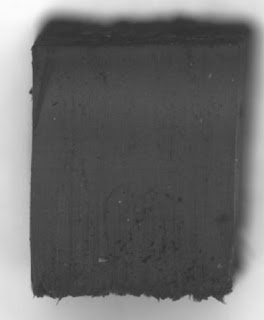“Because of the linear relationship between load and stress, it can be a very good pressure sensor,” said Subbalakshmi Sreekala, a postdoctoral researcher at Rensselaer and author of the study.
Over the course of the experiment, the researchers placed the carbon nanotube block in a vice-like machine and applied different levels of stress. They took note of the stress applied and measured the corresponding strain put on the nanotube block. As it was being squeezed, the researchers also sent an electrical charge through the block and measured its resistance, or how easily the charge moved from one end of the block to the other.
The research team discovered that the strain they applied to the block had a linear relationship with the block’s electrical resistance. The more they squeezed the block, the more its resistance decreased. On a graph, the relationship is represented by a neat, straight line. This means every time one exposes the block to a load of X, they can reliably expect the block’s resistance to decrease by Y.
This reliability and predictability of this relationship makes the carbon nanotube block an ideal material for creating a highly sensitive pressure sensor, Sreekala said.
The pressure sensor would function similarly to a typical weight scale. By placing an object with an unknown weight onto the carbon nanotube block, the block would be squeezed down and its electrical resistance would decrease. The sensor would then send an electrical charge through the nanotube block, and register the resistance. The exact weight of the object could then be easily calculated, thanks to the linear, unchanging relationship between the block’s strain and resistance.
A study published earlier this year (http://news.rpi.edu/update.do"artcenterkey=2217), written by Rensselaer senior research specialist Victor Pushparaj, who is also an author of the pressure sensor paper, showed that carbon nanotubes are able to withstand repeated stress yet retain their structural and mechanical integrity. Electrical resistance decreases as the block is squeezed, as the charged electrons have more pathways to move from one end of the block to the other.
In the new study, Sreekala and the research team found that the nanotube block’s linear strain-resistance relationship holds true until the block is squeezed to 65 percent of its original height. Beyond that, the block’s mechanical properties begin to fail and the linear relationship breaks down.
The team is currently thinking of ways to boost the nanotubes’ strength by mixing them with polymer composites, to make a new material with a longer-lived strain-resistance relationship.
“The challenge will be to choose the correct polymer so we don’t lose efficiency, but retain the same response in all directions,” Sreekala said. ###
In addition to Pushparaj and Sreekala, authors of the paper include Pulickel M. Ajayan, professor of materials science and engineering; Omkaram Nalamasu, professor of chemistry with a joint appointment in materials science and engineering; and Daniel Gall, assistant professor of materials science and engineering. Rensselaer research specialists Lijie Ci, Ashavani Kumar, and doctoral student Sai Kesapragada are also listed as authors.
Funding for the project was provided by the Focus Center New York for Interconnects.
About Rensselaer: Rensselaer Polytechnic Institute, founded in 1824, is the nation’s oldest technological university. The university offers bachelor’s, master’s, and doctoral degrees in engineering, the sciences, information technology, architecture, management, and the humanities and social sciences. Institute programs serve undergraduates, graduate students, and working professionals around the world.
Rensselaer faculty are known for pre-eminence in research conducted in a wide range of fields, with particular emphasis in biotechnology, nanotechnology, information technology, and the media arts and technology. The Institute is well known for its success in the transfer of technology from the laboratory to the marketplace so that new discoveries and inventions benefit human life, protect the environment, and strengthen economic development.
Contact: Michael Mullaney, mullam@rpi.edu, 518-276-6161, Rensselaer Polytechnic Institute
Technorati Tags: Nano or Nanotechnology and Nanotech and carbon nanotubes or pressure sensors and Rensselaer Polytechnic Institute or Fred Thompson TV Ad: Consistent Conservative and Thanksgiving Turkeys' morning exercise and ASU researchers give memory a boost

















2 comments:
wow isnt science amazing?
yes indeed jay, i say that all the time. thanks for stopping by.
Post a Comment